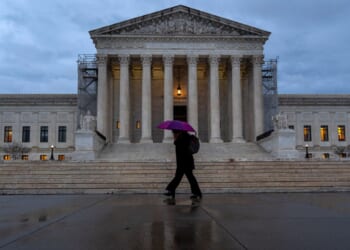The Ligado case tests whether government-issued spectrum licenses amount to protected property rights—and whether blocking their use constitutes a Fifth Amendment taking.
In an era when access to the world fits in the palm of your hand, space on the information superhighway becomes premium property. This scarce spectrum on the airwaves is awarded to companies by the Federal Communications Commission (FCC) to use for everything from mobile phone calls to broadcast radio and television channels. Once granted by the FCC, spectrum can then be leased or even transferred between companies, as evidenced by the recent dealsby EchoStar to sell spectrum to SpaceX ($17 billion) and AT&T ($23 billion).
Of course, the ability of EchoStar to sell its spectrum to other companies suggests a certain sort of ownership of the asset—obviously a highly valuable asset when transacted for those kinds of prices. But can a company that is awarded spectrum but then denied the ability to use it by the government bring a Fifth Amendment takings claim for the loss of its property? That’s the fascinating question at the heart of Ligado Networks v. United States, a case currently pending before the United States Court of Appeals for the Federal Circuit.
From Radio Chaos to Federal Control
A century ago, the newly discovered world of transmitting sound over radio signals was chaos, as the primordial equivalent of ham radio operators sent out broadcasts bumping into one another on the same frequencies. Into that chaos stepped Congress with the passage of the Radio Act of 1927, which authorized a new federal agency named the Federal Radio Commission “to allocate frequencies among competing applicants in a manner responsive to the public ‘convenience, interest, or necessity.’” The Communications Act of 1934 followed soon thereafter, renaming it as we know it today—the Federal Communications Commission—and extending its jurisdiction to other forms of spectrum usage.
The Ligado Dispute
The FCC’s role has become increasingly important as the nation’s economy and national security have become dependent on spectrum as a cornerstone of the information age. Enter Ligado, a Virginia-based company that uses satellites and spectrum to expand 5G for faster speeds and greater connectivity. Twenty-plus years ago (2003), the FCC awarded Ligadoa license to use a certain chunk of spectrum for wireless and 5G services. As time unfolded and the company’s activities evolved, the Department of Defense (DOD) (and to a lesser extent the Department of Commerce [DOC]) raised a concern about interference from Ligado’s proposed spectrum usage with its own use of Global Positioning Satellites (GPS). After a test study, those concerns were resolved to the satisfaction of the FCC, DOD, and Ligado in 2017. But a year later, in 2018, DOD and DOC reversed course, asserting that the GPS interference remained a real concern and blocking Ligado’s use of the spectrum.
In 2020, the FCC made a definitive decision to award the spectrum to Ligado despite the concerns from its sister agencies, finding that the potential interference could and should be addressed through cooperation between Ligado and the DOD rather than cancellation of the application. Nevertheless, DOD has continued to block Ligado’s usage of the spectrum.
According to Ligado’s lawyers, the reason for DOD’s obstruction is straightforward: it has been and is using the spectrum itself for a secret defense program. The details remain classified, but various filings with both the FCC and Congress by the Department consistently reiterate the need to keep the spectrum for its own uses.
The Department has argued vociferously for its overall need for sufficient spectrum to support everything from radar capacity to global communications with ships and soldiers deployed abroad. An independent report from the National Academies of Sciences, Engineering, and Medicine, authorized by Congress to help resolve the dispute, recognized that Ligado’s use could create GPS interference with DOD systems.
The Constitutional Question
The constitutional question picks up where the policy battle ends: does it constitute a taking requiring just compensation under the Fifth Amendment for a government agency to block the use of a highly valuable commercial asset a company has secured from a different government agency?
That may seem like a mouthful, but it’s a question the courts must now answer as Ligado pushes forward with its litigation. Initially filed in the Court of Federal Claims, as all takings claims against the federal government must be, the lawsuit seeks an eye-popping $39 billion in damages—the company’s estimate of the value of the spectrum it has been awarded but is unable to use.
A Question of Property Rights
Late last year, Judge Edward J. Damich denied the government’s motion to dismiss, deciding the company could state meritorious takings claims. After finding jurisdiction in that unique Article I court because the company was not challenging an FCC order (which would have to go through the FCC) but rather bringing constitutional claims against separate agencies, the Court turned to the core question: Does a license to use spectrum become property subject to the takings clause?
In Mobile Relay Associates v. FCC (2006), the United States Court of Appeals for the D.C. Circuit ruled that an FCC license to use spectrum is only that: a license from a government agency. As such, it can be modified or withdrawn by the FCC, but it does not make the spectrum into the licensee’s private property. They are always the public’s airwaves, a foundational premise for the Supreme Court’s First Amendment jurisprudence regarding FCC regulation of broadcasters “in the public interest.” (see, e.g., Red Lion (1969): “Licenses to broadcast do not confer ownership of designated frequencies, but only the temporary privilege of using them.”).
At the same time, the Fifth Amendment applies not strictly to property, but to property interests, a slightly different and broader term that encompasses patent rights and governmental franchises and licenses. The key, according to Ligado, is the right to exclude from a physical space, which an FCC license to use spectrum confers. Here, Ligado says, DOD is squatting on its space, occupying its spectrum for DOD’s own purposes as though trying to establish adverse possession.
Judge Damich distinguished Mobile Relay Associates by applying that line of thought: though Ligado may not have a property right vis-à-vis the FCC as the licensing agency, it does have a right against the DOD, which is not the licensing agency but is nevertheless occupying Ligado’s spectrum for its own purposes.
That ruling is now on an interlocutory appeal to the Federal Circuit, a rare occurrence highlighting the important and precedent-setting nature of the case. Ligado’s appellate team is led by former solicitor general Donald B. Verrilli, Jr., while the US Department of Justice represents the United States and its agencies (though, ironically, it’s clear its agencies do not agree here, as the FCC clearly sees the issue differently than the DOD).
The federal government confers innumerable licenses and permits, but few grant an exclusive right to use a particular concept or physical space. Here, the airwaves concerned hold tremendous commercial value while the DOD asserts important national security interests.
That is why the case has drawn industry attention beyond Ligado itself. On October 6, 2025, USTelecom—The Broadband Association filed an amicus curiae brief supporting Ligado, emphasizing that spectrum licenses confer protectable property rights under the Fifth Amendment. USTelecom warned that the government’s contrary position could “undermine spectrum licensing altogether” and chill billions of dollars in infrastructure investment made in reliance on FCC-issued licenses
Piled atop an interesting legal question, all of that points to continued attention from the bench, bar, and media for this case and what it will mean for spectrum usage moving forward.
About the Author: Daniel R. Suhr
Daniel R. Suhr is president of the Center for American Rights and is a leading constitutional litigator. He previously was a managing attorney of a nonprofit law firm, was a senior advisor to Wisconsin Governor Scott Walker, clerked for a federal judge, and worked for the Federalist Society. He has been featured in the media, including on Fox News, The Wall Street Journal, The Washington Post, and others.
Image: Inkoly/shutterstock

















